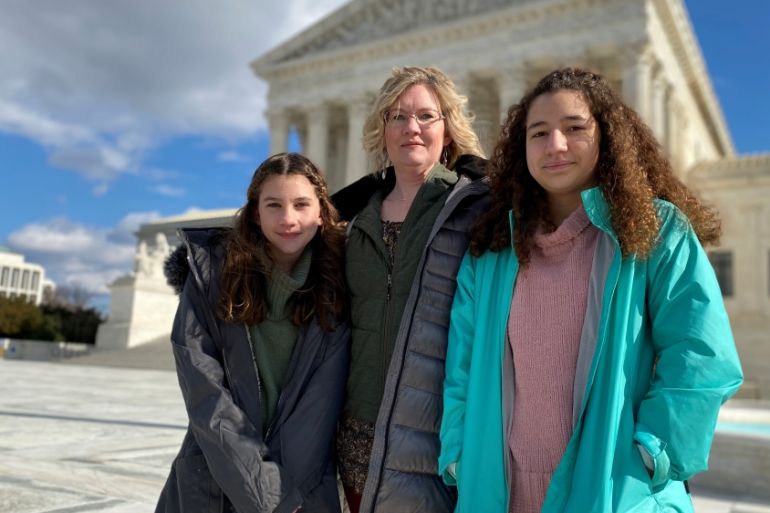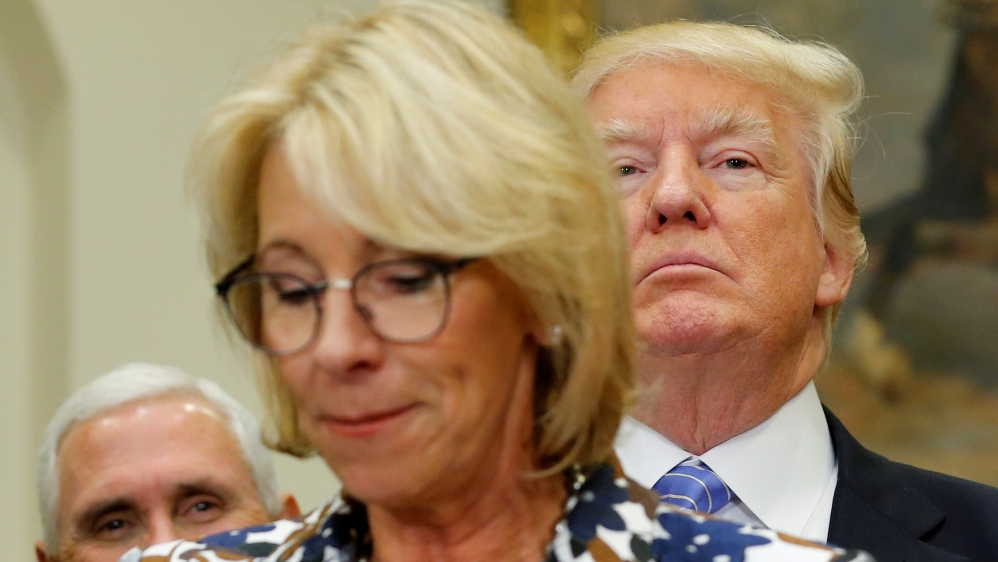SCOTUS lowers wall between church and state with school ruling
The court ruled that states may not discriminate between religious and secular private schools when giving tax credits.

The Supreme Court of the United States narrowed the separation of church and state in a major ruling on Tuesday by endorsing Montana tax credits that helped pay for students to attend religious schools, a decision paving the way for more public funding of faith-based institutions.
In a 5-4 decision with the conservative justices in the majority and the liberal justices dissenting, the court backed a Montana programme that gave tax incentives for people to donate to a scholarship fund that provided money to Christian schools for student tuition expenses.
Keep reading
list of 4 itemsColumbia University leaders face scrutiny over anti-Semitism on campus
Top USC graduate cancelled over Gaza speaks out
Columbia president faces anti-Semitism Congress hearing: What’s at stake?
The ruling (PDF), written by Chief Justice John Roberts, represented the court‘s latest expansion of religious liberties, a priority of its conservative majority in recent years.
The court sided with three mothers of Christian school students who appealed after Montana’s top court invalidated the tax credit for violating the state constitution’s ban on public aid to churches and religious entities.
‘School choice’
Roberts wrote, “A state need not subsidize private education. But once a state decides to do so, it cannot disqualify some private schools solely because they are religious.”
The justices faulted the Montana Supreme Court for voiding a taxpayer programme merely because it can be used to fund religious entities, saying it violated the US Constitution’s protection of the free exercise of religion.
President Donald Trump’s administration supported the plaintiffs in the case. His education secretary, Betsy DeVos, is a prominent supporter of such “school choice” plans. Christian conservatives are an important voter bloc for Trump, who is seeking re-election on November 3.

Thirty-eight states have constitutional provisions like Montana’s barring public aid to religious entities. Opponents have said these provisions were the product of anti-Catholic bias and resulted in impermissible discrimination against religion.
Liberal Justice Stephen Breyer wrote in dissent that the ruling risks “entanglement and conflict” over where to draw the line between allowing free exercise of religion while protecting against government endorsement of religion, both of which are required under the Constitution.
The White House said in a statement that “today’s Supreme Court decision on religious schools … removes one of the biggest obstacles to better educational opportunities for all children.”
Church access to state funds
“States may no longer hide behind rules motivated by insidious bias against Catholics, known as Blaine Amendments, to exclude religious schools from public benefits,” the White House statement read.
The decision followed the court‘s major 2017 religious rights ruling in favour of a Missouri church, Trinity Lutheran, that challenged its exclusion from state playground improvement grants generally available to other non-profit groups.
The court ruled in that case that churches and other religious entities cannot be flatly denied public money even in states whose constitutions explicitly ban such funding.
Churches and Christian groups in the US have sought for years to widen access to taxpayer money for religious schools and places of worship, testing the limits of US secularism.
The Montana tax credit programme, created in 2015, provided up to $150 as an incentive for donations to groups that fund scholarships for tuition to private schools including religious schools.
|
|
In practice, most of the money went to Christian schools. The one such scholarship organisation currently operating provides $500 payments to schools, primarily to help lower-income students attend.
The dispute began when state tax officials limited the programme to non-religious schools to comport with the state constitution’s prohibition on “direct or indirect” public aid to any church or “school, academy, seminary, college, university or other literary or scientific institution controlled in whole or in part by any church, sect, or denomination”.
Lead plaintiff Kendra Espinoza and two other mothers of students at Stillwater Christian School in Kalispell, Montana challenged the exclusion, saying state officials infringed their religious rights under the US Constitution.
The Montana Supreme Court struck down the scholarship programme entirely in 2018 because it could be used to pay for religious schools. Most private schools in Montana are Christian.